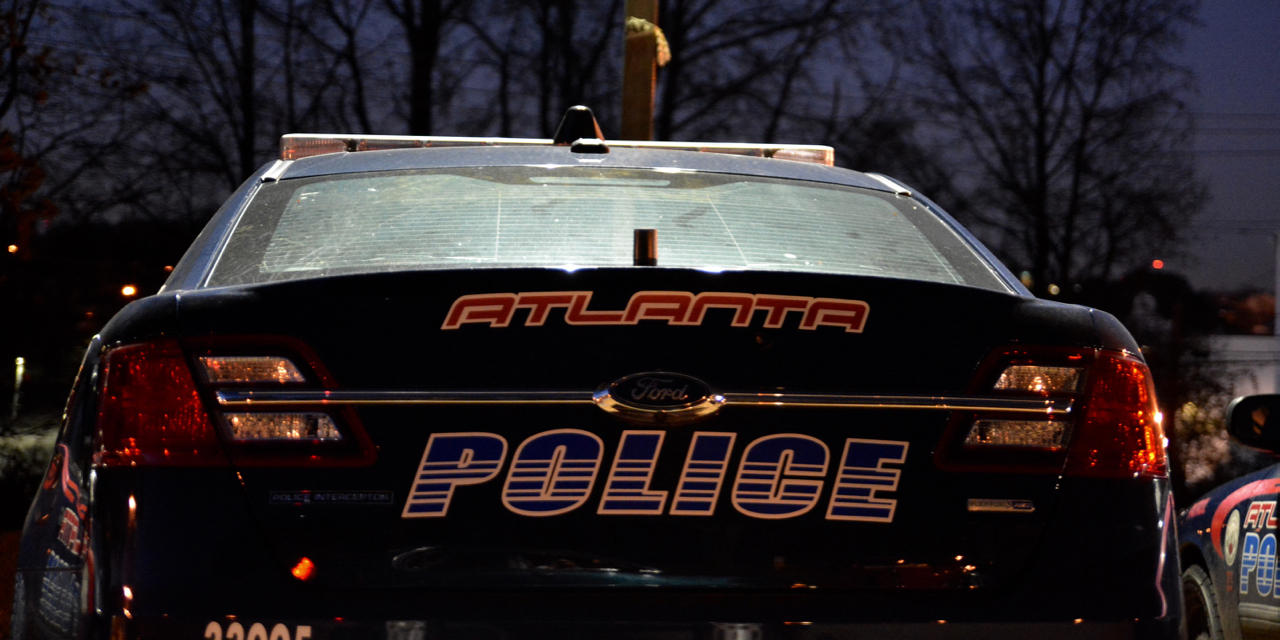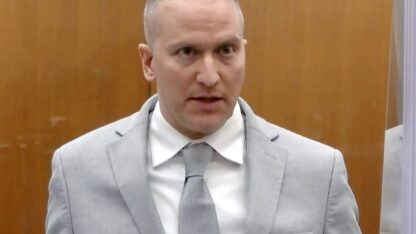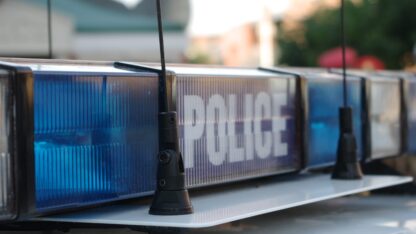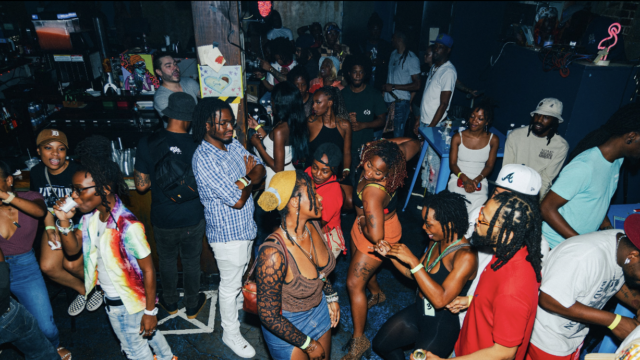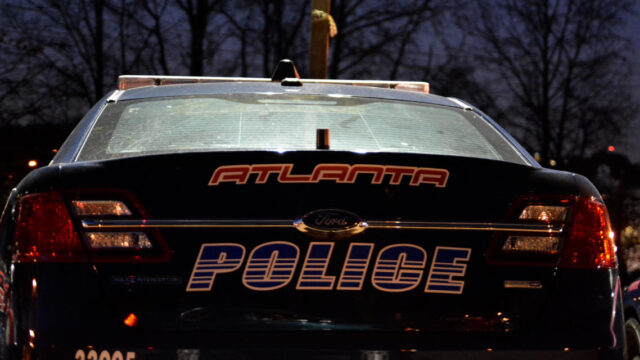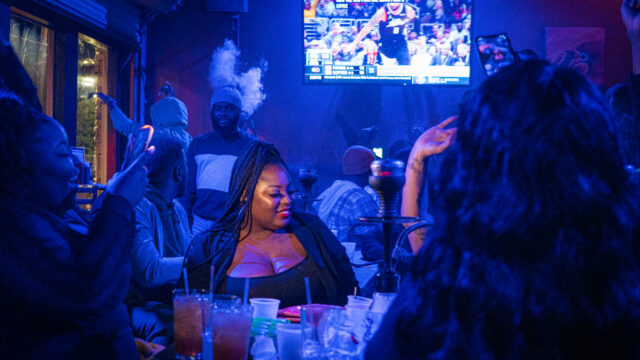This is Part 2 of the 3-part series: Nightlife in Atlanta.
The emergence of Atlanta hip-hop in the ’90s ushered in a new era of nightlife in the city.
In the mid-’90s, there was Freaknik. That fizzled out. Up next was Buckhead.
“I’ve never seen anything like it in my life. It was crazy. People were in the street, everybody’s half naked. Music all over everything. It was like [a] f***ing Ludacris music video on the weekends, particularly in the summer. And it was rowdy and if you look at the crime statistics it was also a lot more violent than it is today. Although nobody really thought of it as such,” says George Chidi, a journalist who reports on crime and law enforcement in Atlanta.
The Super Bowl murders in 2000, when Ray Lewis allegedly stabbed two men to death, was the beginning of the end for Buckhead. The BMF shooting in 2003 accelerated the fall of the club scene in Atlanta.
“Shirley Franklin was mayor at the time … she was looking to make a mark and clamp down and said, ‘Enough.’ And basically shut the whole f****ing street down. Like, shut Buckhead down,” Chidi says.
Developers swooped in and bought up the property. Bad timing on their part, because the 2008 recession pushed back their plans to rebuild. The club scene in Buckhead Village is gone now, replaced with mixed-use highrises and no traces of the partying that happened there.
City leadership made an example out of Buckhead. The Atlanta nightlife scene took a hit that it would never fully recover from.
“There was a lot of … for lack of a better word, repression in Atlanta’s club scene,” Chidi says. “As the mayor was really just trying to get crime under control for political purposes while she was in office.”
Buckhead Village’s fall from glory began with lax enforcement, then a rise in crime linked to nightlife, then a crackdown on nightlife, then erasure of it, followed by developers transforming the space.
Now, after seeing a crime wave in 2021, the whole industry is bracing for stronger enforcement that might threaten what’s left of the fragmented industry.
Crime itself doesn’t seem to be threatening the viability of the industry in Atlanta. But, Chidi says that to some degree, it has shaped who is showing up in these spaces.
“The folks who have a higher tolerance for the potential for violence and understand how to mitigate that, they’re gonna go f***ing party,” he says.
The socioeconomic determinants of crime get left out of the crime prevention conversation when bodies are dropping in front of hookah lounges or strip clubs.
But immediate efforts by the city to reduce crime in Atlanta are facing resistance from those in the nightlife industry, who feel like they’re being unfairly targeted and blamed.

Cracking down on crime
In the early days of the COVID-19 pandemic, Gov. Brian Kemp eased restrictions on businesses earlier than other states on the east coast were willing to. Atlanta had the only active club scene on the east coast, and that attracted tourists that were looking to party, and some conflicts were driven by that.
At the same time, Chidi says gang conflicts became “supercharged.” Shootings were more frequent, the murder rate tripled in Zone 5 (which includes parts of downtown and Midtown), where the murder rate is usually the second-lowest among all police Atlanta zones.
“One of the things that was driving the violence in Atlanta was club-based violence because of the change in sort of entertainment patterns of the city,” he says.
Atlanta police responded to 660 incidents at nightlife businesses in 2021. Officials said many of the shootings that occurred stemmed from arguments, “fueled by a proliferation of guns and a lack of conflict resolution,” according to the Atlanta Journal-Constitution.
The Atlanta Police Department did not respond to WABE by deadline with data going back to 2019, nor with data regarding violent crimes tied to nightlife businesses.
When city leadership made a connection between nightlife and crime, it marked a shift in enforcement, Chidi says.
In February 2021, Mayor Keisha Lance Bottoms and her administration began focusing on making changes to the city’s nuisance property code in an effort to curb violent crime. The first action she took, called Phase I, focused on “ensuring businesses licensed in Atlanta as restaurants are actually operating as restaurants and not bars or clubs,” according to a press release.
“By strengthening the City’s policy on nuisance properties, the City has the opportunity to prevent crime before it occurs,” Bottoms said in a press release.
It’s not clear why a crackdown on restaurants posing as clubs is tied to crime prevention. But it’s worth noting that the city’s first step in preventing violent crime focused on nightlife.
Phase II of the plan was the passing of the violent conduct nuisance ordinance in May 2021. That same month, Bottoms convened a working group to address violent crime. Chidi says that rapper T.I. was brought in to help.
The ordinance beefs up the city’s nuisance property code. It states that a property may be declared a nuisance if multiple violent incidents have occurred there and there are conditions on the property that foster violent crime and endanger public health and safety.
Multiple violent incidents would need to occur before a business is given a citation to appear before a municipal judge, who can convict the property of being a nuisance.
Chidi calls the process opaque, arbitrary and situational. To abate the nuisance — or get back in the city’s good graces — property owners are at the mercy of the discretion of a judge. Some properties may be instructed to hire more security, others could be shut down.
This version of the ordinance is still in effect. WABE submitted an open records request for a list of properties that have been closed under the ordinance, but the Atlanta municipal courts say they could not locate any such records. But according to reports, there are at least six businesses that had been closed: Encore Hookah Bar & Bistro, Ghost Bar, 1050 Social Club, Kiss Ultra Lounge, Deja Vu Sports Bar and Lounge and Brooklyn Kitchen.
An updated ordinance currently stalled in City Council is meant to bring clarity to this process. But the changes made nightlife business owners feel like they are being targeted.
“The purpose of this legislation to some degree, is to get that situationalness out of the system, create a hard set of rules,” Chidi says. “The thing is, everybody’s arguing about what those that hard set of rules actually should be.”
Nuisance property legislation
Councilmember Dustin Hillis is the Chair of the Public Safety and Legal Administration Committee. In May of this year, he proposed an ordinance that would amend the existing nuisance code.
The proposed ordinance states that a judge has the authority to close down a property if it is convicted of being a nuisance. And if a property is convicted of being a nuisance twice within 24 months, it must be closed down by a judge for a period no longer than 12 months.
It’s important to note that it would take multiple instances of violent crime before an owner is summoned to court. How many crimes must occur — or which crimes — is not clear.
With the proposed changes came heightened attention and scrutiny from business owners in the nightlife industry. At one point, four councilmembers dropped from co-sponsoring it due to “public pressure and the lies that have been put out there” Hillis says.
“The issue with this is there were certain people who admittedly didn’t even read the ordinance, and then put out a bunch of false information about how the city’s going after nightlife … that’s all just false. You put the lie out there and then get everyone riled up. That’s their MO, I guess,” Hillis says.
Though not yet codified, the 2021 ordinance made it possible for a property to be shut down after one conviction. Yet, Hillis says that the 2021 nuisance law was passed last year with “relatively zero fanfare.”
Hillis says the ordinance defines what a closure is and defines closure as a remedy. But there are no guidelines on how a judge would decide if a business is a nuisance, and decide if it should be held responsible.
“While the Solicitor’s Office can definitely recommend a sentence, imposition of the sentence is upon the judge. It’s a totally different branch of government so I don’t journey into, you know, what goes into a judge’s mind…”
The proposed ordinance has been bouncing between city council and the public service committee since May, with minimal changes made.
“Given the desire to implement a true padlock law, we will be working with the state legislature to explore that possibility for the upcoming session,” he said in a statement on Nov. 29.
They’re likely trying to model it after Baltimore’s padlock law, which is a stronger nuisance property law that allows a police commissioner to order the closing of a property. State law prohibits this in Georgia.
Perhaps just as threatening to business owners is the prospect of losing their liquor license. If a property violates the nuisance ordinance, according to Chapter 10 of the city’s code of ordinances, it’s at risk of having its liquor license suspended or revoked. For a nightlife business — especially those permitted as bars or nightclubs — such a move would be as detrimental as being shut down.
“I think I can speak for a lot of my colleagues, I support nightlife. We want a vibrant nightlife in the city, but we also want to save nightlife in the city and want people to be able to go out and enjoy themselves with their friends, but also be able to return home to their families at night and not be worried about getting gunned down whether it be randomly or targeted,” Hillis says.
The city’s nightlife and entertainment industry is at the frontlines of the opposition to the ordinance. Opponents of the ordinance point out that certain properties, like Lenox Square Mall in Buckhead, get more favorable treatment than a bar that may have had fewer incidents of violent crime.

Unintended consequences
One of the first people to mobilize against the proposed ordinance was Dona Mathews. She is the co-founder of the Atlanta Hospitality Collective and has been involved in Atlanta’s nightlife industry for over 20 years.
She feels like through the ordinance, the city is perpetuating a false narrative that violent crime is attributed to nightlife. To her, the ordinance is a solution to a problem that doesn’t actually exist.
“Blue Flame, Magic City. These are tight operations,” she says. “I do frequent there because I do feel safe there. We know who the security person is … we go to places where we do feel comfortable, I do feel safe as a woman on my own.”
In the ordinance, a mix of dense language and a lack of detail lent itself to misinformation spreading around the nightlife industry. To many, the ordinance reads that if two instances of violent crime occur at a business, it will be shut down.
“It’s so ambiguous. The language is so loose and so vague. You’re arbitrarily enforcing a law that you don’t even know if your people really truly understand and it’s kind of just left up to these people to arbitrarily enforce it,” Mathews says.
As a former business owner, she understands the difficult position that owners and managers are put in — to be held responsible for the actions of individuals.
“If somebody’s picking up a gun to resolve an argument, you can’t manage that … we can only put things in place to protect us and our people and our patrons and our guests. But to sit there and say I’m responsible for that individual, it’s unfair,” Mathews says.
Many violent crime incidents linked to nightlife involve people getting into an argument inside a business, then exiting to retrieve guns and shoot outdoors.
When someone makes a 911 call to report an incident, it’s traced to the nearest property, regardless of if the incident occurred inside a specific building. An altercation could happen outside that didn’t begin inside a business, and the nearest property could be held responsible.
“The question starts to become, are we going to keep Atlanta a place where local people can grow and thrive here? … This ordinance will wipe out the opportunity to do that.”
Killer Mike at an Aug. 1 Atlanta City Council meeting
Darryl Johnson, founder of the nonprofit The Path: An Agent of Change, Inc., understands the need for public safety measures but opposes the passing of the ordinance in its current form.
He doesn’t think that businesses should be responsible for providing a resource like security. Some nightlife businesses hire off-duty police officers to do security, which can cost thousands of dollars in one weekend.
“Why are we not pouring resources into finding a way to reinforce nightlife in a way that they can provide a level of security without it costing me an arm and a leg to do so?” Johnson says.
“You have to provide a resource in order for me to provide public safety. But if I’m under-resourced, and I can’t provide public safety, you doing a nuisance ordinance doesn’t help the situation, it hurts us,” he says.
Violent crimes are largely happening in the orbit of Black businesses (setting aside socioeconomic factors). Johnson fears that the ordinance will be used to target these businesses. And he says the city is caving to the demands of people in Buckhead, who cite crime as a reason they want to break away from Atlanta.
“The problem with the nuisance in its original form was that there was no level of detail to it that it could not be used or weaponized to also be used to target minority-owned businesses and small business owners.”
“It’s almost a catch-22. It’s like, hey, we don’t do this and we lose Buckhead and then we lose our economy and then everyone suffers. Or we do this and then they have another tool that they can systemically use to dial attack on minority-owned small business owners,” he says.
Johnson and others feel like the ordinance will lead to more gentrification and the erasure of Black, local businesses that make up the fabric of Atlanta’s nightlife industry and help put it on an international stage. Like rapper Killer Mike, who fears that if we don’t grow the local, small businesses here, that everything will be turned over to corporations.
For wealthy property owners, out-of-state developers and gentrifiers — who are more likely to be white — there’s less risk associated with being declared a nuisance because there’s other streams of income they can rely on. And, there’s no existing racial prejudice causing people to associate them with crime.
Those are privileges that small businesses and Black-owned businesses do not have in Atlanta.
While the nightlife industry has historically been resilient to the ebbs and flows of enforcement, things are different now.
If the ordinance is passed and does chip away at what’s been established in the nightlife industry, the rising tide of commercial gentrification will make it harder than ever for the industry to rebound — without the support from city leadership.
